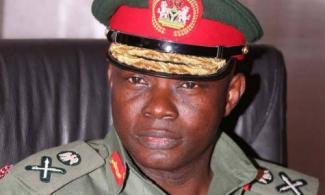
The 10-page document, titled 'Policy On The Use Of Social Media For The Armed Forces of Nigeria', seeks to prevent the use of social media platforms without restraint by military personnel, and also has implications for the military-related social-media activity of friends and families of military personnel.

The Defence Headquarters (DHQ) has issued guidelines on social media use to military personnel, SaharaReporters can exclusively reveal.
Documents exclusively obtained by this website showed that the guidelines arose from a policy instituted in April under the direction of General AG Olonisakin, Chief of Defence Staff (CDS).
The 10-page document, titled 'Policy On The Use Of Social Media For The Armed Forces of Nigeria', seeks to prevent the use of social media platforms without restraint by military personnel, and also has implications for the military-related social-media activity of friends and families of military personnel.
Explaining the reason for introducing the policy, the DHQ noted that Nigeria's adversaries will, without doubt, be keen on mining information from social media communication by members of the Armed Forces of Nigeria (AFN) for immediate or future use.
"It should thus be expected that current and even potential adversaries constantly look for posts by AFN personnel on Facebook, Twitter, YouTube etc and even check the GPS tags of some transmissions. The AFN, therefore, needs to take measures necessary to prevent such adversaries from obtaining information of operational security value from the social media communication of personnel," explained the DHQ.
While stating that military personnel have the right to free speech, the DHQ reckoned that social media communication, because of its wide reach, could significantly affect the reputation and operations of the Armed Forces, hence the need for caution.
According to the policy, social media are classifiable into social networking platforms, wiki, podcast forum, content community and micro-blogging. The policy contains three categories of guidelines for social media use by Armed Forces personnel. These are general guidelines, guidelines for official communication with the public and guidelines for personal use of social media.
The first category requires personnel to ensure they understand a social media platform's audience before joining, as well as being certain if they should post comments on such. It also requires them to always be honest, cordial, professional and to avoid posting classified documents.
For official communication, the guidelines require that "protocols that apply when acting as an official representative of the AFN should be the same for physical and electronic communication". As such, Armed Forces personnel speaking in official capacity are required to secure approval before communicating.
They are also required to familiarise themselves with conventions and etiquette of social media platforms and avoid engaging in social media communication that could bring the Armed Forces into disrepute. The directives prohibit spokespersons from giving out other Armed Forces personnel details, permitting the release of only official contact details such as cell phone numbers, office telephone numbers and email addresses for reference purposes.
Similarly, the guidelines prohibit officials from posting any item protected by copyright. They require posters on social media to ensure that they publish verifiable facts, identify and correct wrong information about the Armed Forces and always ensure that the corporate identity of the Armed Forces is respected.
In addition, spokespersons are required to refer their audience to the websites of the Armed Forces or Services for more information when necessary and ensure that comments or responses made to questions about policy or published information are those appropriate for their roles.
The guidelines further state that only authorised spokespersons or appropriately designated officials can provide comment to the media on issues related to the military and require that media enquiries about social media posts by Armed Forces personnel be referred to appropriate service spokesperson.
Under the last category of guidelines, military personnel are warned that they must always abide by the Official Secrets Act whether in physical or electronic communication. Also, military personnel are expected to note that their audience could be aware of the role in the Armed Forces and as such, misrepresent whatever they say in their personal capacity as the official position.
In similar vein, military personnel are expected to have familiarity with the private settings of platforms they elect to use, prohibited from posting sensitive personal information about themselves or colleagues, or information such as units, schedules, events, locations, weapons and equipment. The guidelines bar personnel from posting video/audio or photographic images of military exercises or operations and make it mandatory for all personnel on operations to to switch off GPS/location functions of their phones to avoid geo-tagging.
According to the guidelines, military personnel will be held liable for security issues arising from posts by their civilian friends and relatives. As such, military personnel are required to educate their friends and relatives on what they should not post on the social media. Personnel are also advised to avoid posting pictures of themselves or colleagues in military uniform as well as pictures showing military platforms, structures and other military-related items. The DHQ also warned that military personnel engaged in personal use of the social media must not make any reference to the Armed Forces.